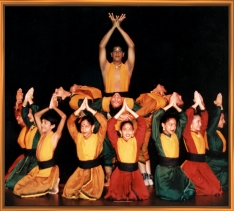
Satyam Sivam Sundaram (Collaboration)
Satyam Sivam Sundaram was staged to celebrate the Tenth Annual Natya Adyayana Gurukulam organised by The Fine Arts Society of Yogaville. This production was inspired by the teachings of Poojyashree Sachidanandaswamiji.The script used is in simple Tamizh poetic verse written by Prof. Muthukannappar. A combination of Kathakali, Bharatanatyam, freestyle dance movements and drama, the dance drama is interspersed with pure dance sequences, subtle expressive pieces, and complicated footwork also incorporates dramatic, yet realistic depiction of various animals that adds to the richness of the production.
Synopsis
It is a universal story of human pursuit of peace and joy. King Dharmika, with all his accomplishments, comforts and power is still unhappy. He does not understand why his subjects fought over religion, caste and creed while the animal kingdom enjoyed perfect harmony and peace. Thus, he sets forth on a journey to find the truth.Opening Scene (The LOTUS: Light of Truth Universal Shrine):
The opening dance starts with the colourful formation of the lotus symbolising the theme of the dance drama. This formation is also intended to represent the Lotus Temple, the Light of Truth Universal Shrine, in Yogaville, Virginia, which contains a shrine for each major religion of the worldScene Two (Prakrithi or Beauty and Power of Nature...Sakthi Prabhaavam):
Mahakavi Bharatiyar, the greatest of the 20th century Tamizh poets eulogizes the power of Nature, symbolized as 'Maatha Paraasakti', the mother of everlasting energy. Prakrithi or nature is made up of five elements (earth, water, fire, air and ether). Everything emerges out of one power and submerges into that wholesome truth...Scene Three:
There once lived a learned king called Dharmika, who had mastered the language of birds and beasts. He listened to their constant mocking of the ways of mankind, the wars of prejudice fought in the religion, race etc. The king, discontented with his world, sets out in search of peace taking his sword (the symbol of power) with him.His first destination is the ashram that the animals had so often praised. Here he finds peaceful coexistence of all creation and is mesmerized by its tranquility. He realizes the futility of his search for peace while still carrying the sword, he leaves it behind with the sage and continues his journey.
He then comes across a lioness hunting a cow. The cow pleads for mercy for the sake of her newborn calf. The lioness releases the cow on her word that she will return after feeding her calf. King Dharmika is surprised to see the cow keep her word and return. Pleased by the cow’s honesty and selfless love, the lioness spares her life saying her calf is too young to be left motherless. She vows to return in a few years to claim her hunt as this was the law of the jungle.
Dharmika continues his journey. He attends the sermons of great saints on the banks of the Ganga, yet forgetting his newfound values; he demands that a chandala (untouchable) moves out of his way. The chandala replies, "O King, who did you ask to get out? The life that is the same within you and me or the mortal body that perishes and submerges with Prakrithi (Nature), where there is no difference between king and untouchable?"
Dharmika repents and understands the ultimate truth of spiritual oneness and returns home. After realising that the truth is one and paths are many, king Dharmika returns to his kingdom. On the way back he sees that the once peaceful Ashram was a scene of devastation. The sword (symbol of power) left with the sage, was misused by him to cut grass, branches of trees and ultimately the innocent animals. In fear of being victim of power misuse, each started indulging in suspicion and self-protection by using their own power. The king overpowers the hermit and retrieves his sword, the symbol of power that had corrupted even a hermit.
Dharmika returns to find his subjects peaceful and happy in his absence, more importantly the absence of the power that he wielded over them. Realizing the corruption of power, he rids himself of his sword that is the symbol of power and adopts the ways of truth, love and beauty. The king and his people live happily in the realization of Satyam (Truth), Sivam (God) and Sundaram (Beauty).
Musicians
N Sasidharan - vocalsK P Ramesh Babu - mridangam
R Kalaiarasan - violin
S Sunil Kumar - flute
Manoj Kumar - percussion
